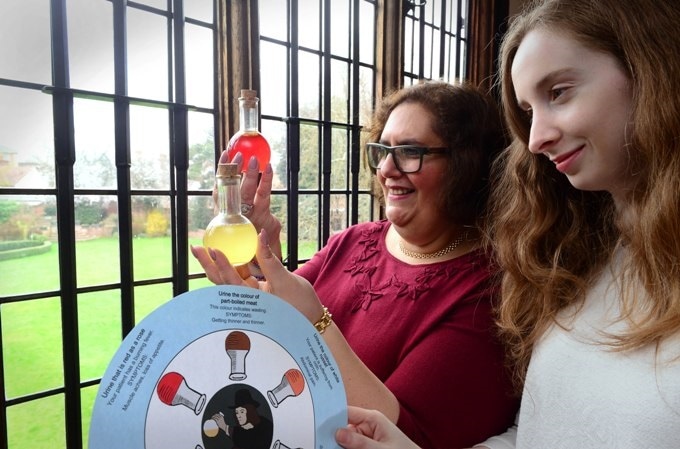Mar 24 2017
The Shakespeare Birthplace Trust has launched a brand new medical exhibition at Hall’s Croft, home of Shakespeare’s daughter Susanna and her physician husband, John Hall. Method in the Madness: Understanding Ourselves Then and Now explores medicine in the lifetime of Shakespeare’s son-in-law, John Hall (1575 – 1635), who lived at and practiced from Hall’s Croft.

SBT07 - Visitors compare urine samples to a uroscopy wheel
The exhibition not only explores the medical methods of the Tudor period, but also how medicinal discoveries in this age acted as the foundation upon which modern medicine is based. It looks at the contemporary understanding of mind and body and how this interpretation fed into theories of disease and illness, and the best means to cure them. Advances in anatomy and physiology, including William Harvey’s discovery of the circulation of the blood are also featured, culminating in a study of John Hall himself, the man, the medicine, the casebook and of course, the Shakespeare connection.
Throughout his time in Stratford, John Hall kept detailed notes of 178 of his medical cases, published posthumously under the title Select Observations on English Bodies in 1657. It provides a wealth of insight into both his own practice and wider medical theories of the time. The exhibition also features a range of objects from the 1500s and 1600s including a syringe, a urine flask and a drug jar. Also on display are replica surgical tools such as an amputation saw and a crown trephine, alongside books such as The Herball (1597) and Robert Burton’s famous The Anatomy of Melancholy (1621).
Lucy Dale, Interpretation Officer at the Shakespeare Birthplace Trust, said:
Visitors will learn how John Hall and his contemporaries understood their minds and bodies, health and disease and how this fed into the medicine of the time. Throughout the exhibition, visitors will also catch glimpses of modern medical beliefs and practices, taken from interviews with medical professionals including a staff nurse, a professor of muscle physiology and a trainee clinical psychologist. These viewpoints allow visitors to compare medicine then and now. By providing a modern comparison, we hope to remind people that while methods vary, the battle against disease is nothing new.
Interactive stations throughout the exhibition will enable visitors to diagnose their own patients - comparing urine samples to a uroscopy wheel, get hands on with replica surgical instruments including a pair of forceps, a folding lancet and a scalpel, and even dress up as John Hall and pose for a photograph. For younger visitors a children’s challenge The Method in the Madness Medical Missions includes a range of puzzles and activities.
The walled garden at Hall’s Croft is also undergoing a transformation to compliment the exhibition, featuring a new medicinal garden abundant with fragrant herbs and plants which would have been used in contemporary remedies.
Method in the Madness is a permanent exhibition at Hall’s Croft (until further notice). Entry to Hall’s Croft is included in the Town Houses pass (Shakespeare’s Birthplace, Shakespeare’s New Place and Hall’s Croft) and costs £17.50 for adults, £11.50 for children or £46.50 for a family (2 adults and up to 4 children, under 3s go free). All tickets are valid for 12 months unlimited entry, book online and save 10%.